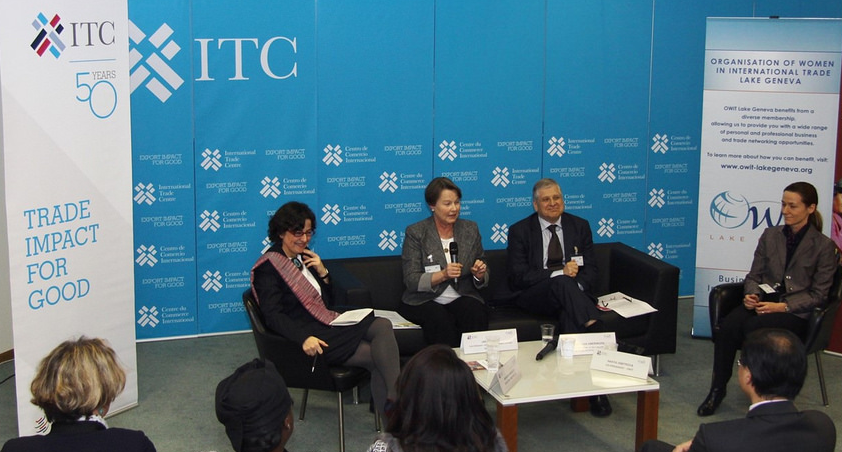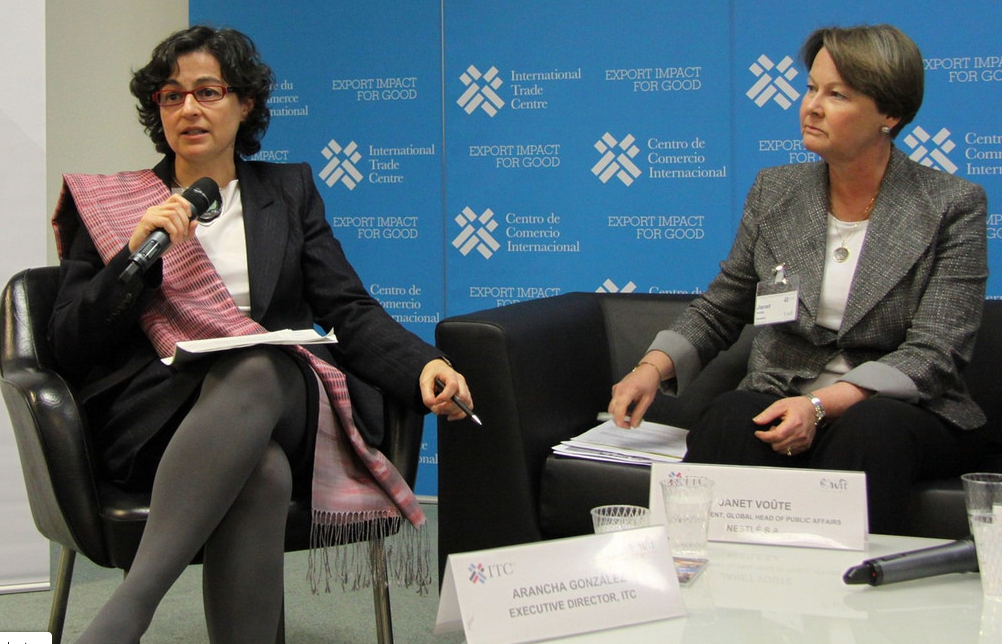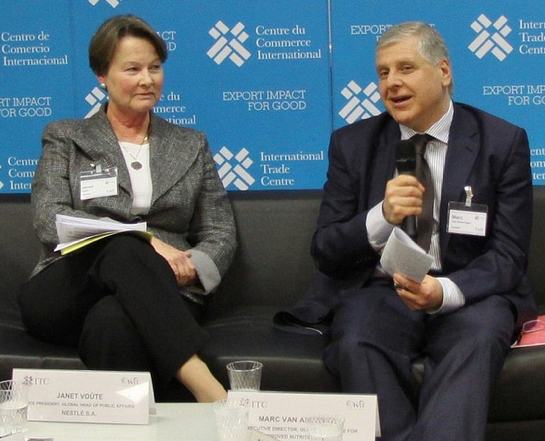 According to academics Michael Porter and Mark R. Kramer, companies can create shared value. They can improve working conditions, reduce risk and support small enterprises, while also increasing their own productivity and expanding markets. Can women entrepreneurs in developing countries benefit from the ‘shared’ value created by these companies? This is the topic that we wanted to explore at the co-hosted ITC /OWIT Lake Geneva event, “Creating shared value: A role for women entrepreneurs in developing countries”.
According to academics Michael Porter and Mark R. Kramer, companies can create shared value. They can improve working conditions, reduce risk and support small enterprises, while also increasing their own productivity and expanding markets. Can women entrepreneurs in developing countries benefit from the ‘shared’ value created by these companies? This is the topic that we wanted to explore at the co-hosted ITC /OWIT Lake Geneva event, “Creating shared value: A role for women entrepreneurs in developing countries”.
On March 4, 2013 the International Trade Center (ITC) and the Organization for Women in Trade, Geneva (OWIT) co-organized this meeting on the occasion of the International Women’s Day. Ms. Arancha González, Executive Directors of the ITC moderated the meeting. Ms. Janet Voûte, Nestle Vice President of Global Head of Public Affairs and Mr. Marc Van Ameringen, Executive Director of the Global Alliance for Improved Nutrition (GAIN) shared their ideas and experiences on the role of women in shared value initiatives. Ms. Nasya Dimitrova, Co- President of OWIT, closed the meeting with valuable remarks on the shared value promoted by our organization.
 Ms. González started by reinforcing the importance of businesses creating socio-economic value at the heart of their activities. However, when it comes to advancing women’s economic opportunities, signing the UN Women’s Empowerment Principles is, and should not be enough, she remarked. Ms. Voûte proceeded to expand on the meaning of shared value for Nestle, and to reflect on how this initiative can improve women’s situation on the ground. For Nestle, the principle of creating shared value is at the core of their business: it makes sense for Nestle to create shared value in the areas of nutrition, water and rural development. Promoting sustainable agriculture, for instance, allows Nestle to work with farmers, teach them to use new and better techniques, to improve the quality of their products, and ensure the sustainability of the supply chain.
Ms. González started by reinforcing the importance of businesses creating socio-economic value at the heart of their activities. However, when it comes to advancing women’s economic opportunities, signing the UN Women’s Empowerment Principles is, and should not be enough, she remarked. Ms. Voûte proceeded to expand on the meaning of shared value for Nestle, and to reflect on how this initiative can improve women’s situation on the ground. For Nestle, the principle of creating shared value is at the core of their business: it makes sense for Nestle to create shared value in the areas of nutrition, water and rural development. Promoting sustainable agriculture, for instance, allows Nestle to work with farmers, teach them to use new and better techniques, to improve the quality of their products, and ensure the sustainability of the supply chain.
Did you know that Nestle’s SV efforts are committed to increasing women’s participation in the supply chain? The company leads initiatives that go from helping women to build coffee and cocoa businesses; to helping small growers create cooperatives; to buying directly from women dairy farmers. By doing this, Nestle empowers women, opens up their economic opportunities and, at the same time, strengthens a sustainable supply chain for its business.
 Mr. Van Ameringen’s intervention presented a distinct view on women’s current situation and companies’ capacity to create shared value. From GAIN’s perspective, the problems that women face, in relation to nutrition, are big and are not addressed by most corporate players. 120 million women and children are underweight; women own only 1% of the world’s land and have reduced access to extension services and financial support, making it harder for them to become productive farmers and growers. The concept of ‘shared value’ is interesting and helpful, but still remains a small part of most companies’ operations – due, perhaps, to the contradictions between profit-making and doing social good in the current capitalist model, he noted. Mr. Van Ameringen referred to 3 areas that will need to be addressed to improve nutrition and empower women: a) structural issues that inhibit women from owning land or accessing finance; b) regulatory frameworks to drive changes in companies, that go beyond incentives to doing social good; and, c) provision of support services at all levels, particularly when dealing with women.
Mr. Van Ameringen’s intervention presented a distinct view on women’s current situation and companies’ capacity to create shared value. From GAIN’s perspective, the problems that women face, in relation to nutrition, are big and are not addressed by most corporate players. 120 million women and children are underweight; women own only 1% of the world’s land and have reduced access to extension services and financial support, making it harder for them to become productive farmers and growers. The concept of ‘shared value’ is interesting and helpful, but still remains a small part of most companies’ operations – due, perhaps, to the contradictions between profit-making and doing social good in the current capitalist model, he noted. Mr. Van Ameringen referred to 3 areas that will need to be addressed to improve nutrition and empower women: a) structural issues that inhibit women from owning land or accessing finance; b) regulatory frameworks to drive changes in companies, that go beyond incentives to doing social good; and, c) provision of support services at all levels, particularly when dealing with women.
To finalize such a vibrant and informative discussion, Ms. Dimitrova referred to the shared value that our organization creates. OWIT provides a platform for women to develop professionally, share knowledge, expand their networks and exert leadership. “A society where women are active, is a healthy society”, she concluded.
The controversial question of whether companies could accomplish social gains continued during the Q&A session. Some companies, like Nestle, say to live up to the commitments made to the communities where their factories operate. However, this is not the case for all companies. As Mr. Van Ameringen said, significant changes happen through pressure – from policies, governments, consumers and shareholders. Moreover, when it comes to empowering women entrepreneurs, the issue is even more complex: we need to break structural barriers, promote coherence in policies and provide women entrepreneurs with access to markets. On the bright side, companies like Nestle are actively engaging with women entrepreneurs; initiatives like GAIN are advocating for women’s improved nutrition; organizations like the ITC are working with governments to set policies that support women entrepreneurs; and others, like OWIT, are committed to the promotion of women leadership.
The discussion panel ended with a delicious cocktail. People gathered to meet; to continue discussing the topics at hand; to enjoy themselves, and to add value to such an interesting evening.
*****
See the photos of the event here
*****